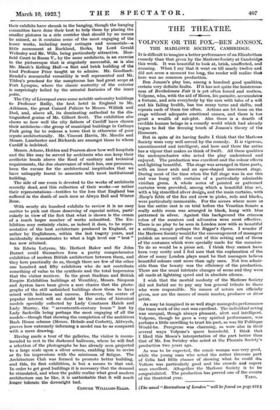THE THEATRE.
VOLPONE OR THE FOX.—BEN JONSON.
THE MARLOVVE SOCIETY, CAMBRIDGE.
Fr is difficult to imagine a better performance of an Elizabethan comedy than that given by the Marlowe Society at Cambridge this week. It was beautiful to look at, brisk, unaffected, and amusing. When I say that it went on till nearly twelve and did not seem a moment too long, the reader will realize that here was no common production.
Ben Jonson's play has, among a hundred good qualities, certain very definite faults. If it has not quite the boisterous- ness of Bartholomew Fair it is yet often forced and restless. Volpone, who, with the aid of Mona, his parasite, accumulates a fortune, and sets everybody by the ears with tales of a will and his failing health, has too many turns and shifts, and repeats each of them too often. Actions are let loose on the stage without adequate emotional causes, and there is too great a wealth of sub-plot. Also there is a dearth of credible human beings In a comedy world which had already begun to feel the freezing touch of Jonson's theory of the Humours.
But in spite of its having faults I think that the Marlowe Society were very well served by the comedy. It is vigorous, unsentimental and intelligent, and here and there the satire has a vigour that makes us think of Swift. All these qualities the undergraduates who acted the play understood and enjoyed. The production was excellent and the colour effects and lighting beautiful. The stage was arranged in three parts, with an inner arch and an apse-shaped innermost stage. During most of the time when the full stage was in use this end was hung with curtains of a particularly admirable viridian green. A whole series of painted or patterned curtains were provided, among which a beautiful blue set, with a big stencilled silver design, and the main curtains, with iF.sop's fable of the fox and crow in pinks, reds and blacks, were particularly memorable. For the scenes where more or less the entire cast is on trial before the Venetian Senate a really noble room was arranged in black, hung with blue patterned in silver. Against this background the crimson robes of the senators and advocates were most effective. There is no play to be seen in London now with so beautiful a setting, except perhaps the Beggar's Opera. I wonder if the Marlowe Society would for the encouragement of managers publish an account of the cost of this setting and of those of the costumes which were specially made for the occasion- To do so would be a pious act. I think they cannot have been very costly and I feel sure that the explanation of the decor of many London plays must be that managers believe beautiful colours cost more than ugly ones. Not less admir- able than the beauty was the efficiency of the production. There are the usual intricate changes of scene and they were all made at lightning speed and in absolute silence.
I wish that the morbid modesty of the Marlowe Society did not forbid me to pay any less general tribute to those who were responsible. No names of actors are officially given, nor are the names of music master, producer or decor artist.
As may be imagined in so well stage managed a performance the team work of the cast was excellent. The individual acting was unequal, though always pleasant, alert and intelligent. Volpone, though he gave a very spirited performance, was perhaps a little unwilling to trust his part, as was Sir Politique Would-be. Peregrene was charming, as were also in their several ways Volpcme's queer household. I think that I liked this Moses's interpretation of the part better than that of Mr. Ion Swinley who acted at the Phoenix Society's production two years ago.
As was to be expected, the comic woman was very good, while the young man who acted the rather tiresome part of Celia had little chance of showing what he could do., Vonore was particularly good and the crowds and supers were excellent. Altogether the Marlowe Society Is to be congratulated. The production has proved one of the events










































 Previous page
Previous page